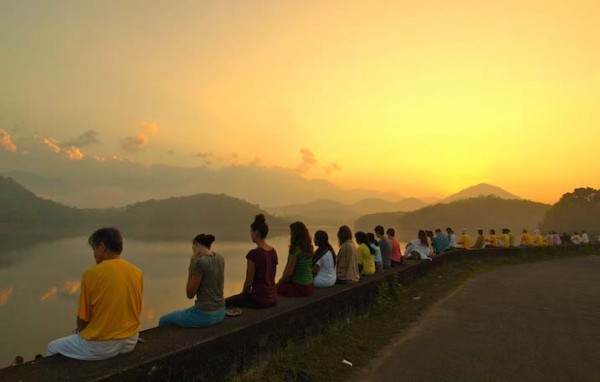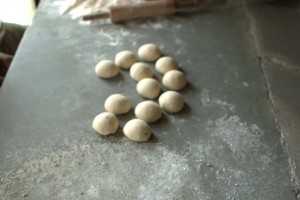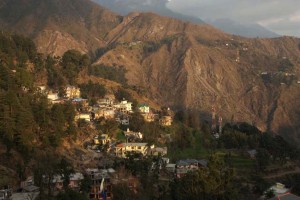Selectively compassionate and rarely altruistic
WAKE UP, meditate, do yoga. Shower, dress, leave. Cravings arise for a parantha from the street vendor next to my favorite juice stall. The juice stall is suffering from a power outage. I feel disappointment. I remember the principles of a recently completed vipassana meditation course equanimity in the face of impermanence the craving for the juice subsides, but not for the parantha.
Sitting at the food stall while the boy makes the parantha, daydreams ensue about how a lazy Saturday will be spent. Granola at the cafe and hopefully running into the woman I have a crush on. Read, write, nap. Let the day dictate the action.
My daydreams are interrupted as my eyes catch the ankle of a man sitting on the street across the way. Im curious as his ankle seems to be in a physically impossible position. Is experience deceiving me?
In the vipassana course the teacher emphasized that the truth experienced is much more powerful than any intellectual understanding. Looking further to rectify what intellect tells me against my experience, I observe the base of his leg before his ankle. Its touching the ground as if he has no ankle and foot.
Yet, his ankle and foot lay flat next to where the base of his leg is touching the ground, everything is still connected. The awareness works its way to other parts of his body his other leg is prosthetic, his hands are suffering from leprosy, his face is without expression. His eyes work in conjunction with one extended hand to follow the passers by. An empty tin cup and crutches lay by his side.
It becomes painful to observe him anymore. Squeamishness arises. Im feeling compelled to act, but dont know what can be offered to improve his situation. The resulting thought pattern becomes unpleasant, uncomfortable and soon my attention returns to the boy making the parantha.
You like to cook? says the boy noticing my attention to his work.
Nodding, I ask in return, That dough is just flour and water, yeah?
Yes.
And the filling? Alloo, mattar, coriander? Anything else?
Onion, garlic.
Before rolling it out, he takes the dough ball and stuffs the potato filling into the middle. He then encloses the filling by pulling the dough around it, making the dough ball look like a pillow.
In vipassana meditation, students are allowed to use as many pillows as they want to make sitting for 10.5 hours a day more comfortable. The pillows help delay the pain, but never make it disappear. One could build a throne of pillows, but eventually the physical pain throughout the body must be faced.
Through this process the student learns that the experience of physical pain is a tool to observe how our minds react to uncomfortable situations. If one cultivates equanimity, just observing the pain for what it is a rising and falling sensation and by its nature impermanent then the pain eventually dissolves. The sooner the student develops the courage to feel and observe the pain, the sooner it can be dissolved.
Realizing how my mind had reacted to the man across the street I end the diversion and face him. What circumstances led him to this condition? My judging mind immediately assumes drug and alcohol abuse.
In vipassana, students learn through experience that all our outside circumstances are a direct result of what happens in our minds. These circumstances can change if we have the courage to face ourselves and patterns of thought. I wonder if this mans situation is that simple?
Not too long before observing this man, I ended my morning meditation the way the vipassana course taught, with mehta loving kindness and the wish for all living beings to experience love and compassion, for myself to give only love and compassion, for all beings to be free from pain and suffering, to view all beings as friends.
No one can change the mans past circumstances that led to his current condition, I think, but by observing him, one becomes aware of the current situation and in response feels compassion. Compassion fuels action to relieve suffering. The action taken is unique to the capabilities of each person.
Feeling satisfied after finishing breakfast, I look across the street and wonder what can be done in this moment to help. I feel love and compassion for the man and feel compelled to act out of these simple feelings, and nothing else.
One more parantha please, for the man across the street. Ill pay for both, I say, standing up.
I hand the boy money and head out of the stall. The man across the street begins to stir in preparation to move on. The boy shouts across the street telling him to stay because Ive bought him some breakfast. Feeling awkward, I put my head down, not wanting to be acknowledged as I leave. Still, the man across the street speaks to me some words in Hindi. I look up with a short smile to acknowledge and move on.
Now Im on my way to the cafe to run into my crush. I dont pat myself on the back or feel proud, Ive already forgotten about what Ive done. Only later, after sitting and thinking, do the circumstances of my giving come back to mind. I wonder to myself, at the age of 29, have I just acted altruistically for the first time in my life?
Or, did I miss some deep-rooted, self-interested emotion in the moment of giving? I cant remember another circumstance of giving where I had no expectation of return, not even the expectation of feeling good about myself. Is this what true compassion yields? Have I really lived this long without ever giving in this way?
Back on the street and walking briskly, I hear a women say to me, Hallo Babaplease? I look down and observe an elderly women with a similar case of leprosy, cracked spectacles, and torn clothes. After a glance I walk past, ignoring her.
Later, the circumstances of my selective compassion become apparent. Why the first man and not the second woman? What are my responsibilities as a person with relative privilege? My bank account tells me that I could have offered health care, food, and clothing to the second woman.
Should I choose to do this for one, must I do it for others in a similar condition? If so, Id run out of money pretty quickly, and martyrdom is not appealing nor does it seem to be a solution. Without clear-cut answers the expectation that I should perform perfectly compassionate in every situation lingers, and Im upset with myself over my lack of perfection.
This time I dont refer to vipassana to explain the circumstances, although Im sure it could. Rather, I recall something out of a book Ive been reading about compassionate communication. An axiom of communicating and moving compassionately, says the book, is to first have compassion for yourself.
Looking back on how Ive been treating myself over my choice to give, I notice theres another layer of selective compassion Ive missed compassion for myself. ![]()




Comments